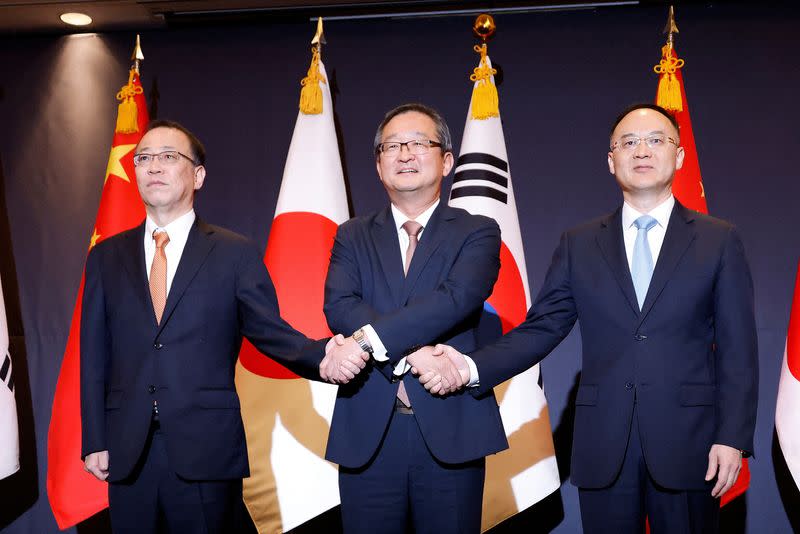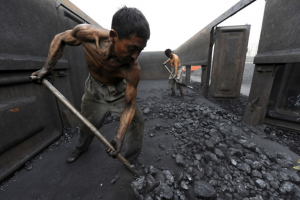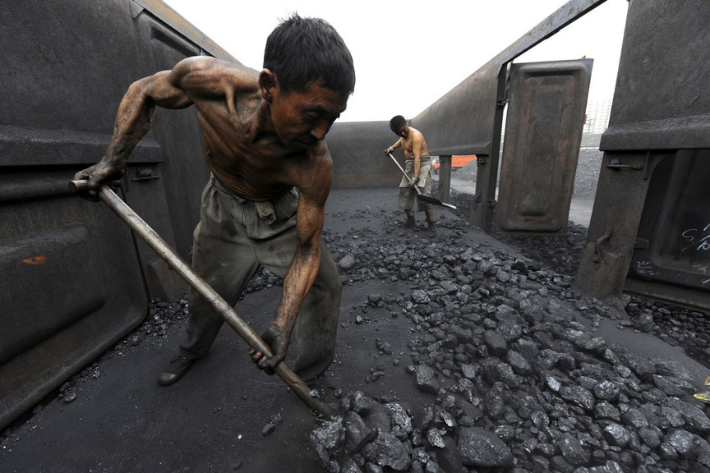Diplomats from South Korea, China and Japan said on Tuesday they want to host a three-nation summit again this year.
Leaders of the three countries would meet at the “earliest convenient time”, Seoul’s foreign ministry said after a rare meeting aimed at reconfiguring trilateral talks that were discussed over 15 years ago.
The three countries had agreed to hold a summit every year starting in 2008 to foster regional cooperation, but that initiative was frayed by bilateral feuds and the Covid pandemic. The last summit was in 2019.
ALSO SEE: Key Evergrande Unit Misses $547m Bond Dues as Crisis Worsens
Seoul’s foreign ministry said in a statement that specific dates remained under discussion and that the countries’ foreign ministers would meet “in a couple of months”.
South Korea is this year’s host for three-way meetings and has proposed a summit in late December, Japanese broadcaster TBS reported.
Beijing wary of Seoul and Tokyo’s tighter ties
Japan’s foreign minister, Yoko Kamikawa, said the three countries share the need to restart high-level talks, including summits, “as soon as possible”.
“I believe it is very valuable to discuss the various challenges the region faces,” she told a briefing in Tokyo.
The latest meeting was seen partly intended to assuage Beijing’s concerns over the two US allies’ tightening cooperation after Seoul and Tokyo agreed this year to end legal, diplomatic and trade disputes over issues dating to Japan’s 1910-45 occupation of Korea.
“We unanimously believe that carrying out cooperation is in the common interests of the three parties,” Chinese foreign ministry spokesperson Wang Wenbin said on Tuesday. “We should work together to strengthen practical cooperation … and make new contributions to regional peace, stability, and prosperity.”
South Korean President Yoon Suk Yeol and Japanese Prime Minister Fumio Kishida have taken steps to mend ties and in August held a historic trilateral summit with US President Joe Biden, where the three vowed to boost cooperation, including on defence and economic security.
China discomfort over THAAD anti-missile system
A senior South Korean official said China has been proactive in seeking trilateral cooperation and arranging meetings since bilateral ties soured over the deployment in 2017 of a US THAAD anti-missile system in South Korea.
“I’m sure there should be some discomfort on their side regarding our increasingly close trilateral security partnerships with the United States and Japan,” the official said, speaking on condition of anonymity because of the sensitivity of the situation.
“There seems to be a view there that they need to properly manage bilateral ties with us, as they saw how their THAAD responses backfired and fuelled anti-China sentiment to serious levels.”
Beijing will most likely look to leverage trilateral trade ties to counterbalance the US friend-shoring strategy, promote people-to-people exchanges, and enhance communication and dialogue with Seoul and Tokyo on security and defence matters, said Tong Zhao, senior fellow at the US-based Carnegie Endowment for International Peace.
Japan and South Korea have an interest in avoiding conflicts and maintaining a stable security relationship with China, and Beijing’s assistance in slowing down, if not halting, North Korea’s extensive nuclear development program, he added.
“These shared interests open up new avenues for strategic communication, confidence-building, and measures to prevent crises,” Zhao said.
China’s premier has traditionally attended the trilateral summits, and South Korea is also pushing for a separate visit by President Xi Jinping.
The latest meeting involved South Korean Deputy Foreign Minister Chung Byung-won, Japanese Senior Deputy Foreign Minister Takehiro Funakoshi, and Nong Rong, China’s assistant minister of foreign affairs.
US in talks on big arms sales to Hanoi
The issue of trilateral talks by the three North Asian neighbours comes as the US discusses a major arms deal with Vietnam, its former Cold War adversary – a deal that would irk China and sideline Russia, sources revealed on Saturday.
A package, which could come together within the next year, could consummate the newly upgraded partnership between Washington and Hanoi with the sale of a fleet of American F-16 fighter jets as the Southeast Asian nation faces tensions with Beijing in the disputed South China Sea, one of the people said.
The deal is still in its early stages, with exact terms yet to be worked out, and may not come together. But it was a key topic of Vietnamese-US official talks in Hanoi, New York and Washington over the past month.
Washington is considering special financing terms for the pricey equipment that could help cash-strapped Hanoi steer away from its traditional reliance on lower-cost, Russian-made arms, according to one source, who declined to be named.
“We have a very productive and promising security relationship with the Vietnamese and we do see interesting movement from them in some US systems, in particular anything that can help them better monitor their maritime domain, perhaps transport aircraft and some other platforms,” a US official said.
- Reuters with additional editing by Jim Pollard
ALSO SEE:
South Korea Talks to US on Chip Curbs As Waivers Near Expiry
Chip Plants, AI, Boeing Deals Agreed at US-Vietnam Meetings
Biden Keen to Upgrade US Partnership With Vietnam – Politico
Camp David Summit Signals New Cold War, With China – Observer
Chinese Warships Circling Japan After Taiwan Remarks – CNN
























